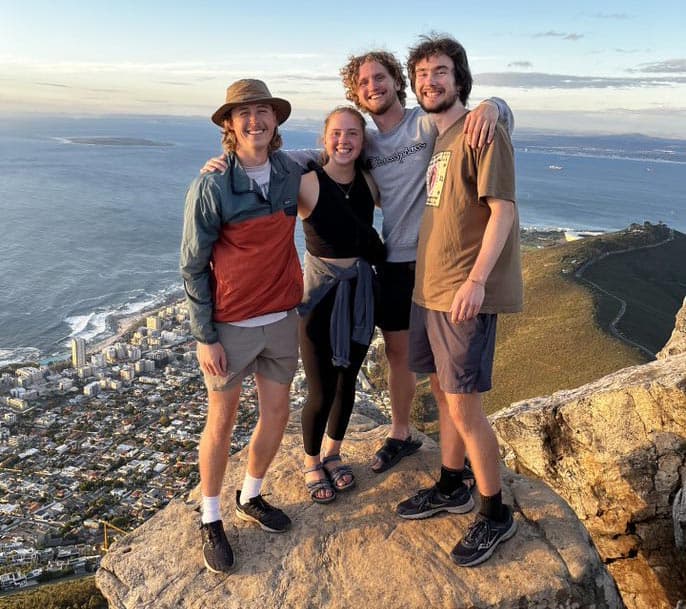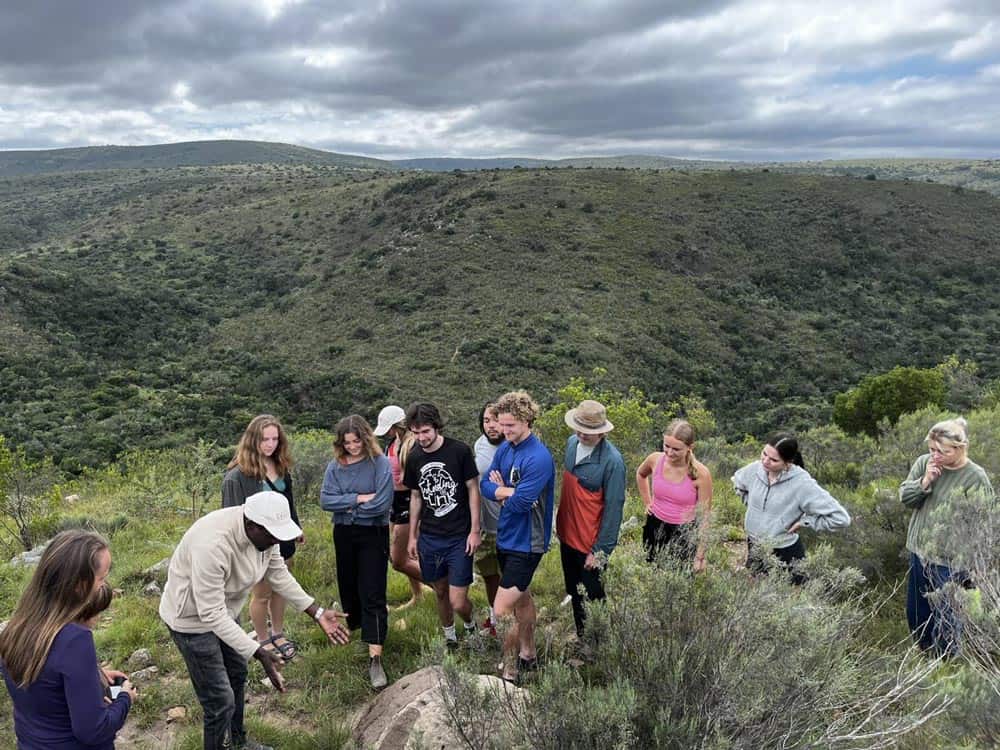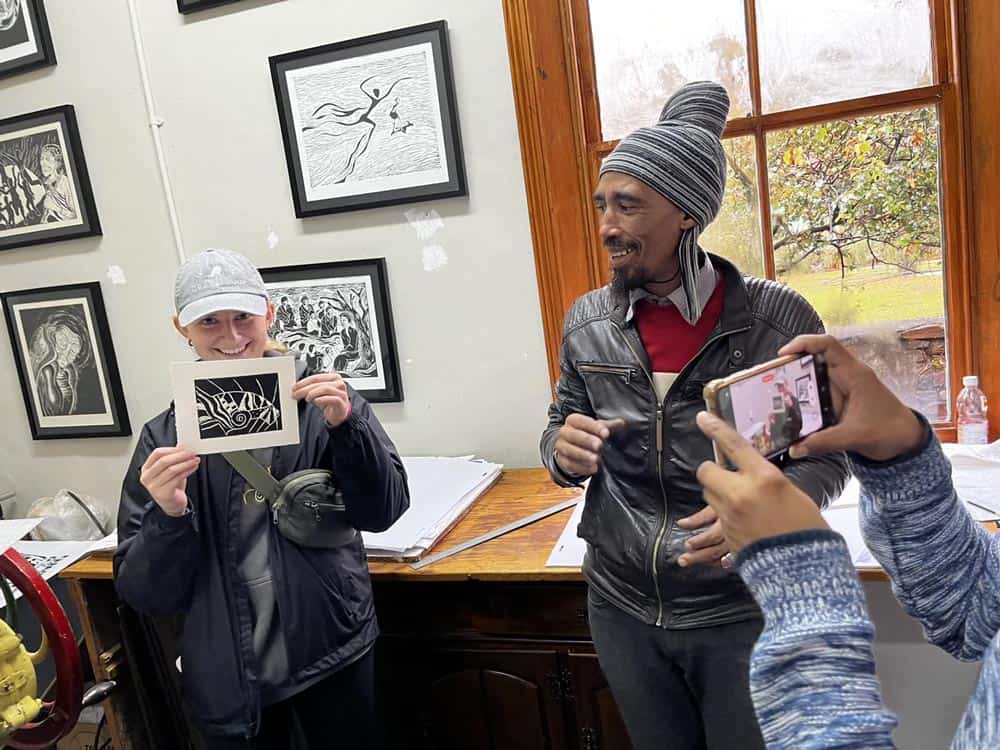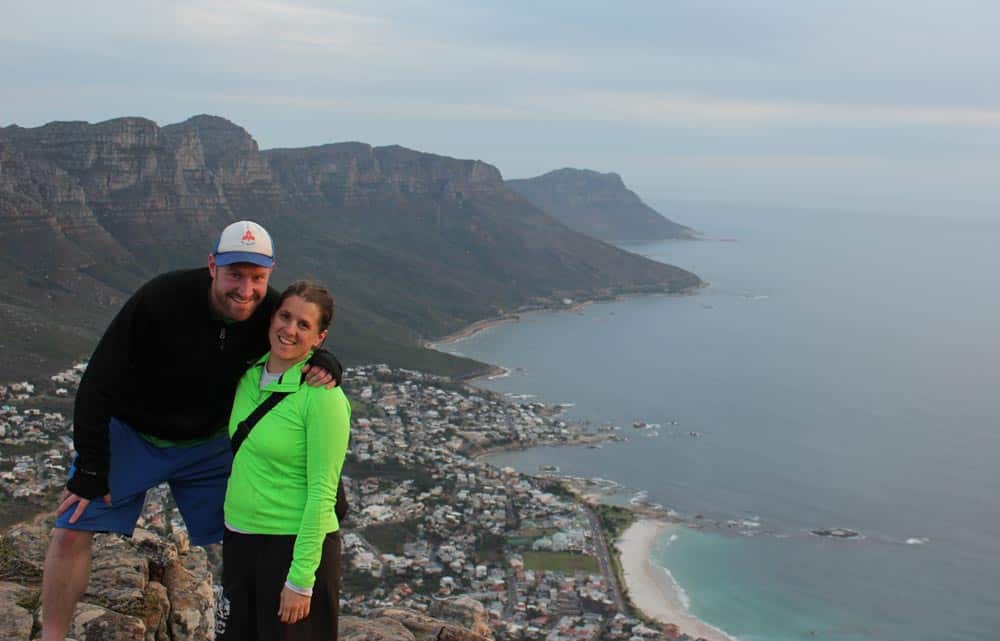Kyhl Lyndgaard ’99 and Charlie Matuska ’24 will always share something in common – along with a few hundred others who have come through the College of Saint Benedict and Saint John’s University during the last quarter-century. They’ll always have South Africa.
Lyndgaard, who majored in English at SJU, was among the first to experience a semester-long study abroad program 25 years ago in Port Elizabeth – a city of almost a million people that in recent years has been renamed Gqeberha (pronounced keb-AIR-kah). In 2023, eight years after becoming a visiting assistant professor of environmental studies at Saint John’s, he returned to South Africa as faculty director for a group that included Matuska, whose family has a strong connection to the country as well.
“The connections we made will last a lifetime, and going past all the cultural and social boundaries we were faced with to have positive interactions with a wide variety of people taught me something I’d never learn in a class back on campus,” said Matuska, whose mother, Nichole, previously was a program manager for CSB and SJU students going to South Africa – one reason his brothers, Jack ’20 and Will ’21, studied abroad there, too.
“For instance, we volunteered at Missionvale Care Center and I spent most of my time there in a small room with 10-15 South African women working on crafts,” Charlie said. “We would make bracelets and necklaces. I might be sewing or knitting. But the great value for me was to spend a lot of time chatting with them. They taught me a lot.”
So, it’s with a nod to nostalgia and longevity that Saint Ben’s and Saint John’s acknowledge one of the oldest study abroad programs in their portfolio as it transitions to a new in Stellenbosch, which has a population of about 20,000, just outside of the capital, Cape Town. It’s more than eight hours by car, or an hour and a half by plane, west of Gqeberha, where the host institution was Nelson Mandela University. During spring semester, under faculty director Ellen Block (chair of the sociology department), the site will shift to Stellenbosch University, a public research school with more than 25,000 undergraduates.
“We had a wonderful experience in Gqeberha and this move is about being able to have more academic offerings,” said Kevin Clancy ’00, director of the Center for Global Education at CSB and SJU. “Our students will be able to interact as part of a larger international program. Where they used to be able to choose from among four or five classes that they would take with only international students, now they’ll be able to choose from about 30 – in addition to the faculty course we provide. Plus, they will be taking classes in and among the general student body. That should make the experience even more robust.”
CGE applications for the 2024-25 academic year at CSB and SJU open Nov. 1. Other options include Argentina, Austria, France, Greece, Italy, Japan and the United Kingdom during the fall semester. Argentina will be a new offering, a transition from a previous study abroad option in Chile. Spring options include Australia, Ireland, Spain and the UK in addition to South Africa. But Lyndgaard and Matuska, not to mention hundreds of others, admit to being a little biased toward the second-most populous country located entirely south of the equator.

Charlie Matuska, Lauren Funke, Aidan McDonell and Tom Hobday climbed high above Cape Town during an excursion last spring in South Africa. All returned to Saint Ben’s and Saint John’s for their senior year this fall.
Lyndgaard among first and last to visit Gqeberha
When Lyndgaard first studied in South Africa in 1998, the country was only a few years removed from an Apartheid era that had its roots in Dutch and British colonial rule and, for 45 years beginning in 1948, formally classified people by race – with different rights and limitations. He recalls that during his visit, Mandela was still president of South Africa, Bill Clinton visited during his second term as U.S. president, and Lyndgaard even attended some of the hearings of the South African Truth and Reconciliation Commission.
“I remember listening to what was said with an earpiece,” Lyndgaard remembered. “It was like being at the United Nations because there were so many people who spoke different languages. It was history happening before our eyes. I was looking for a place where I would get out of my comfort zone. I wanted to go to a non-western country, and what I found was a place that in the 1990s was a model for the world about what was possible through restorative justice.”
In Gqeberha, students typically took four four-credit classes as well as a service-learning class. Fridays and the weekends were free to explore the country. For Lyndgaard, that included lots of cycling and hiking.
“For me when I was an undergraduate and later as a guide for the students last spring, my top goal was to be self-reflective in order to explore our own culture and values from the vantage point of someplace with historical parallels yet was still quite different,” he said.
Activists, writers, journalists and scientists shared searing stories and the students offered their own written reflections on difficult topics based on some of their interactions. At Missionvale, those included working in the soup kitchen, sewing, sorting garbage, tending to a vegetable garden and helping at an elementary school.

Camryn Leary, Mackenzie McDonald and Aidan McDonell didn’t have to look far to find clues that they weren’t in Minnesota, or even the United States, anymore.
South Africa truly made Matuska’s education ‘global’
Matuska is a global business leadership major and said that interest likely grew from when he traveled to South Africa for two weeks with his mother five years ago.
“I’ve never really thought about it before, but that first trip might have planted the seeds for what I decided to study,” he said. “Saint John’s was definitely a draw for me because I knew I would be able to go back.”
Matuska studied in Ireland during the summer after his sophomore year, working for a nonprofit organization and taking one class. Then, for the spring semester of his junior year, he returned to South Africa. It marked a return after the COVID-19 pandemic for CSB and SJU, too, as the program was idle in 2021 and 2022.
“It was very different from what I experienced in Dublin and what, I imagine, a lot of other study abroad experiences might be,” Matuska said. “There were only 11 of us in our group. We were all in the same courses and worked at the same volunteer sites, so we spent a lot of time together and really bonded. Only a small portion of the population is white, but those people have traditionally held much of the wealth of the country. It’s hard to compare to what we know in the U.S., but the changes in South Africa have been fairly recent. When you’re there, you can still feel the aftereffects of that change. The current government is trying a lot of programs, but they’re still trying to even out the socioeconomic opportunities and general well-being of life.”
While Gqeberha is a large city, Matuska said it wouldn’t easily be mistaken for anything back home. The water from the taps in their apartment building was undrinkable. He and the others had to walk five blocks and pay for fresh water once a week, which they carried home in large jugs. They also learned to accommodate “load shedding” on the electrical grid.
“It’s completely overloaded by the population, and it was the worst it’s ever been when we were there,” Matuska said. “We were without electricity from four to eight hours a day in blocks of about two hours at a time. So, we had load-shedding meals and non-load-shedding meals.”
He said the most impactful travel he experienced was a trip to Lesotho, a high-altitude, land-locked kingdom encircled by South Africa. Matuska made the seven-hour trip there with Lyndgaard and fellow Johnnie classmate Tom Hobday and found most of the population living in stone huts with almost no running water or electricity.
“I hope future groups get out of familiar situations and extend themselves, too,” said Matuska, who also spent about 10 days in Cape Town. “When you add some things that might bring a little discomfort to your life, those are what you remember the most and what make the biggest impression on you.
“It’s an unbelievable country,” he added. “There are negative connotations in the way people from the outside perceive it, but there’s a lot more to South Africa than its recent history overcoming social unrest.”

A guide shows the most recent class of Bennies and Johnnies studying in South Africa a termite hill. The bugs are edible to South Africans and have a minty flavor. Nearly all of the students managed to try one.
Stellenbosch offers new amenities, proximity to capital
Block, who in 2024 will celebrate 10 years teaching at CSB and SJU, is very familiar with South Africa. She spent much time there while researching her first book Infected Kin: Orphan Care and AIDS in Lesotho (2019, Rutgers University Press) with her co-author and husband, Will McGrath. The book examines the ways AIDS transcends infected individuals and seeps into kin relations and networks of care. And her teaching and research areas of interest center on the intersections of health, kinship and care in sub-Saharan Africa and the United States.
She is excited that Stellenbosch is affiliated with the American Institute for Foreign Study (AIFS), which encompasses tuition, housing, social and cultural activities, insurance and emergency services all under one organization.
“I think after COVID, we learned that we wanted more support and AIFS is going to have a program manager right there on the ground with us,” Block said. “They’re experts at dealing with study abroad programs all over the world, so that should make it easier for me to focus on teaching our students and helping to guide their experience and for the students to dig into a range of experiences.”
Instruction at Stellenbosch, as it is at other institutions in South Africa, is in English. But the country’s constitution recognizes 11 other languages. The CSB and SJU students also will participate in a service-learning course at Ikaya Primary School in Kayamandi, offering a chance to learn more about the people and the socio-political realities of the nearby wine farm region. Excursions might include day trips to an ostrich farm, elephant sanctuary, and nearby mountains and beaches.
During their semester abroad, students pay their regular CSB and SJU tuition and, instead of housing and meal contracts, they pay a program fee that provides accommodations and some ground transportation. Airfare, meals and laundry expenses and costs for books or supplies are not included.
Block’s group of nine students leaves in early February and will return in early June.
“Stellenbosch is a nice college town,” Block said. “Outside it are townships that are mostly populated with farm laborers and domestic workers. In that sense, it will be similar to Gqeberha. But Cape Town is only about 40 minutes away, so the students should get a good flavor of all aspects of a major country in the Global South.
“Not only am I looking forward to returning to South Africa but I’m going to enjoy getting to know some of our students in a real, meaningful way,” added Block, who will be joined by her husband and their three children. “You spend so much time together that a week there feels like a semester here.”
But whether it’s Gqeberha or Stellenbosch, with Lyndgaard or Block or any faculty director to come, the goal of the South Africa study abroad program remains the same.
“It’s a rainbow nation,” Clancy said, referring to the country’s population that is about 80% black and 80% Christian but with significant pockets of other races and religions. “It’s culturally much different than what we are used to in the United States, with a different history that continues to evolve. Our students navigate that difference and return home with a more complex global perspective because of the experience.”

Ellie Schmaltz, a senior political science and pre-law major from Richmond, Minnesota, gets instruction during a printmaking workshop at the Bethesda Arts Centre and Bushman Heritage Museum in Nieu Bethesda, South Africa. The instructor/artist at right is Naasley Swiers.

Kyhl Lyndgaard ’99, who served as a faculty advisor for CSB and SJU students studying in South Africa last spring, recreated an image from 1998, when he was part of the schools’ first group to travel to Port Elizabeth, now called Gqeberha. After 25 years at Nelson Mandela University, Saint Ben’s and Saint John’s will move their study abroad program to Stellenbosch University in the spring of 2024.

Ellen Block (right) and her husband, Will McGrath, pause at a perch on Lion’s Head overlooking Cape Town during a previous research trip to South Africa in 2015. Block will lead the first group of Bennies and Johnnies to Stellenbosch University, just east of Cape Town, during the spring semester of 2024, with her husband and three children along for the ride.
